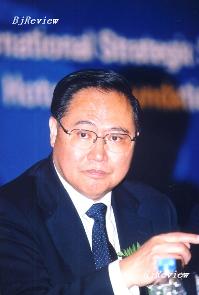
China made big strides in its diplomatic push in 2006 as it confronted changing global conditions, according to Xiong Guangkai, President of the China Institute for International Strategic Studies and former Deputy Chief of General Staff of the Chinese People's Liberation Army. Xiong was recently interviewed by Study Times, a journal run by the Party School of the Central Committee of the Communist Party of China, on these and other diplomatic issues. Excerpts follow:
Study Times: What are your views on the profound and rapid changes in international affairs during 2006?
Xiong: In 2006, in general, global security was stable. Peace and development remained the two themes of the times, but regional turmoil and tensions escalated. Hot topics emerged one after another.
First, unconventional security threats kept increasing. International terrorist activities rose prodigiously. By the end of November 2006, there were 593 terrorist attacks around the world, 65 percent higher than that of the same period of the previous year. They had killed 4,500 people and left more than 9,700 injured, up 55 percent and 35 percent, respectively. The international oil prices fluctuated dangerously with strategic competition for major oil-producing areas and energy routes very tense. Public health security was a focus of attention, and we should keep alert to the return of bird flu.
Second, conventional security threats remained a prominent problem. Regional wars and armed conflicts totaled 44 worldwide in 2006 with five new eruptions, the highest since the end of the Cold War. The international nuclear non-proliferation efforts achieved little progress. In October 2006, North Korea conducted a nuclear test, making its nuclear issue more complicated. Although the fifth round of the multilateral talks on the Korean nuclear issue was held in Beijing on December 18-22, thanks to efforts of all relevant parties, how the question will develop is still uncertain. Meanwhile, the Iranian nuclear issue was still in a deadlock. These situations were heavy blows to the international nuclear nonproliferation regime.
As far as China is concerned, at present and for the foreseeable future, the most serious and realistic threat to the country is from "Taiwan independence" secessionist forces. In 2006, cross-Taiwan Strait relations made new progress. But regardless of strong opposition in and outside the island, Taiwan authorities' leader Chen Shui-bian announced in February that the "National Unification Council" would cease to function and the Guidelines for National Unification would cease to apply, taking another false step toward the "de jure independence" of Taiwan. Later, Chen said on many occasions that he was to push for independence through "constitutional reforms," which fully reflects his stubborn secessionist stance. The mainland is trying to safeguard and promote the peaceful and stable development of cross-strait relations with the greatest sincerity, in the hope of achieving peaceful reunification of the motherland. At the same time, we are firmly opposed to "Taiwan independence" and will never allow "Taiwan independence" secessionist forces to make Taiwan secede from China under any name or by any means.
You have said that 2006 saw prominent adjustments in international relationships, as dramatic changes occurred in global conditions. Why do you think so?
Currently, a new round of adjustments of multilateral and bilateral relationships is taking place both regionally and globally, while a multi-polarization tendency continues to develop.
|
